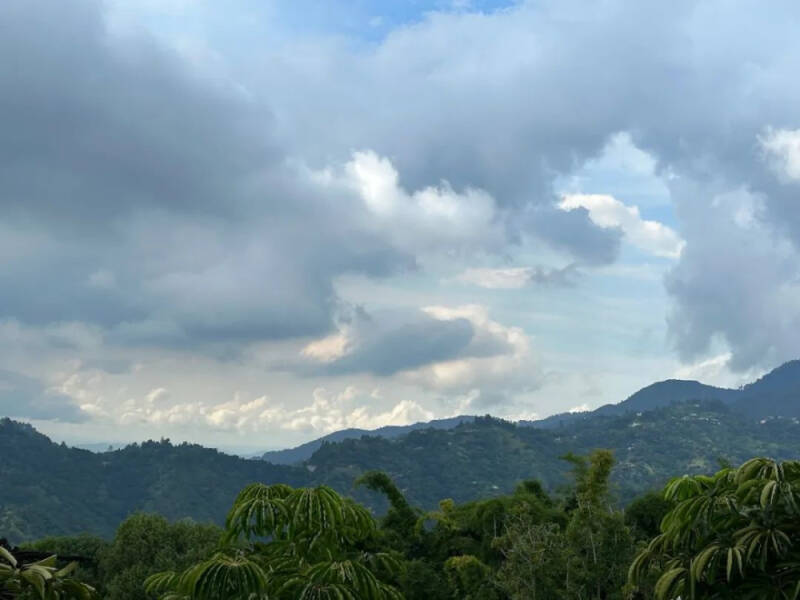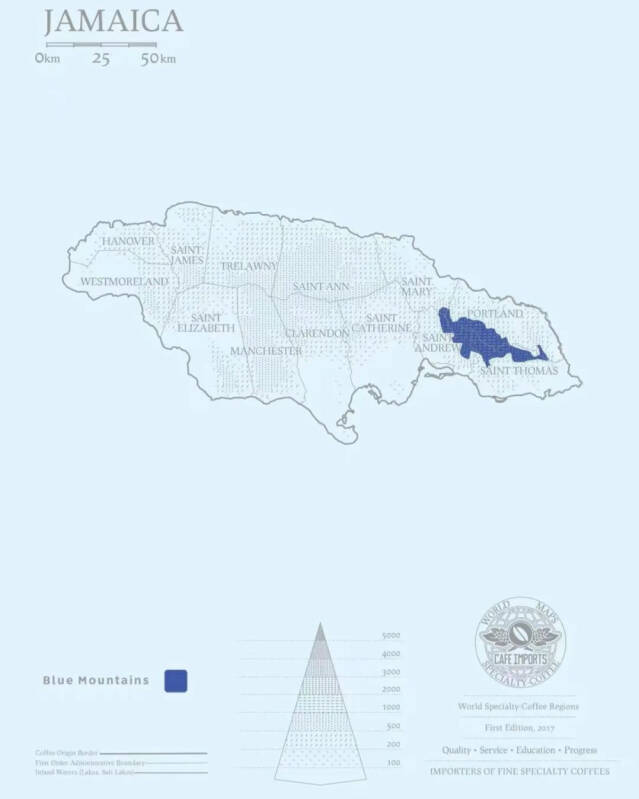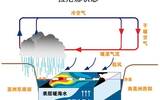Jamaican Coffee | Blue Mountain No. 1 Coffee at Clifton Manor
Speaking of the most famous coffee, we have to go to Blue Mountain Coffee, which is known as the best coffee. In the period of Blue Mountain Coffee, because of its rarity, high quality and unique flavor, coffee lovers are competing for treasures. The success of Blue Mountain Coffee is inseparable from the support of the Jamaican government for coffee cultivation.
Jamaican Coffee
Jamaica is one of the Caribbean island countries, facing Haiti across the Jamaica Strait to the east, and is the third largest island in the Caribbean. The coastal areas of Jamaica are plains, mountains in the east, hills and limestone plateaus in the middle and west. Belongs to the tropical rain forest climate. The rainy season is from May to June, September to November, and the dry season is from December to March of the following year. The north-central region is rich in rainfall, the temperature is generally between 22 and 32 degrees, and the annual average temperature is 27 degrees. It is located in the earthquake zone, with fertile volcanic soil, fresh air, humid climate, foggy and rainy all the year round. This climate has created the world-famous Jamaican Blue Mountain Coffee.

Blue Mountain Coffee producing area
The Blue Mountain range is located in eastern Jamaica, at an altitude of 1000-1700 meters. It is surrounded by the Caribbean Sea. When the weather is clear, the sun shines directly on the sea, and the peak reflects the blue mountain light of the sea, hence its name. The coffee growing belt of the Blue Mountains has fertile volcanic soil, fresh air and humid climate, foggy and rainy all the year round, which has created the world-famous Jamaican Blue Mountain Coffee. And the area is also planted with Blue Mountain iron trucks, which have evolved to have better disease resistance than ordinary iron trucks after more than 200 years.

In order to revitalize the coffee industry, the government passed a decree in 1891 to improve quality by teaching producers knowledge about coffee cultivation, as well as improving infrastructure to enable coffee to be centrally processed and graded. The Central Coffee Clearing House (Central Coffee Clearing House) was also established in 1944, and all coffee must be approved by it before it can be exported. In addition, the Jamaica Coffee Industry Council (The Jamaica Coffee Industry Board, referred to as CIB) was established in 1950, but the organization merged with other Jamaican commodity agencies in 2018 to form JACRA (Jamaica Agricultural Commodities Authority), and every barrel of Blue Mountain coffee beans must now be subject to quality control through JACRA. When it was founded, it also promulgated the "Coffee Industry Supervision Law", delineating the world-famous "Blue Mountain Coffee growing area". According to the Coffee Industry Supervision Law, the Blue Mountain planting area is distributed in four areas: St.Andrew, St.Thomas, Portland and St.Mary. Only the coffee varieties grown in this area with an altitude of 915m-1700 m can be named Jamaican Blue Mountain Coffee (Jamaica Blue Mountain).
Clifton Manor
Clifton Hill is the oldest coffee producing area still in operation in Jamaica. Clifton Farm began to grow and produce coffee as early as the mid-18th century. The monthly coffee processing plants here are located at an altitude of 1300 meters above sea level. Adequate altitude, adequate sunshine and rainfall, as well as mineral-rich volcanic soil to improve the good growth conditions of coffee trees.
And Blue Mountain Coffee is the only coffee in the world that is exported in wooden barrels. Only Jamaica Blue Mountain (No. 1, No. 2, No. 3, PB) and Jamaican Alpine (Alpine Top, Alpine PB) can be used, with specifications of 70 kg, 30 kg and 15 kg. Among them, the most advanced Lanshan No. 1 coffee must meet the specifications of more than 17 mesh, the proportion of defective beans can not exceed 2%, and the moisture content is about 10-12.5%. The lid of the barrel is marked with the trademark of Jamaican Blue Mountain Coffee, and other grades of Jamaican coffee are exported in 60 kg gunny bags.
Iron pickup Typica
Iron pickups, which originated in southwestern Ethiopia, were taken to Yemen between the 15th and 16th centuries, to Java in Indonesia in 1696, to Amsterdam in the Netherlands in 1706, and then to Dutch Guiana (now Suriname), all the way to French Guiana and Brazil, and to Martinique in 1723.
After traveling to many countries, the British introduced the iron pickup from Martinique to the Blue Mountains of Jamaica in 1730, and it is one of the oldest varieties of coffee on the iron pickup, but it is no longer widely planted because of its weak physique and poor disease resistance. However, the iron pickup in the Blue Mountains can well adapt to the local climate and soil, and evolve a better disease resistance, these characteristics can not be separated from the Jamaican country to adhere to and carefully plant iron card varieties.
Front Street Coffee Jamaica Clifton Manor Blue Mountain one Coffee Bean production area: blue Mountain Manor: Clifton Manor elevation: 1310 meters varieties: blue Mountain Iron pickup Typica treatment: washing flavor: slightly citrus acid, nutty, chocolate flavor silky overall balance
Qianjie Coffee Lanshan No.1 coffee beans are washed and roasted moderately deep, so that Lanshan No.1 coffee can show a mellow taste and retain soft acidity. The front street will use a KONO filter cup, 1:15 ratio, 90 ℃ of water will be boiled, you can smell the light flowers, the entrance will feel a slight citrus acid, with nutty and cocoa flavor, the taste is smooth and well balanced.
Important Notice :
前街咖啡 FrontStreet Coffee has moved to new addredd:
FrontStreet Coffee Address: 315,Donghua East Road,GuangZhou
Tel:020 38364473
- Prev

Where does the smell of iced coffee come from? What are the grindness, proportion and parameters for making cold-extracted coffee? What is low temperature ripening?
"clean, mellow and smooth" is people's second impression of the ice drop after tasting it. Why is it the second? Because often, people will be shocked by its strong and long-lasting fermented wine aroma, and only when they come to their senses do they begin to notice that it tastes so excellent. Like some friends who have just come into contact with ice droplets in the front street store.
- Next

El Nino will end around April, La Nina will return to affect coffee producing areas
Recently, according to the latest weather forecast from the latest Climate Forecast Center of the Meteorological Bureau, El Ni ñ o weather conditions are expected to end around April 2024, after a neutral period, La Nina weather will form during the period from June to August. La Nina weather continues throughout the second half of the year. Recently, Ernie
Related
- What grade does Jamaica Blue Mountain No. 1 coffee belong to and how to drink it better? What is the highest grade of Blue Mountain coffee for coffee aristocrats?
- What are the flavor characteristics of the world-famous coffee Blue Mountain No. 1 Golden Mantelin? What are the characteristics of deep-roasted bitter coffee?
- Can I make coffee a second time in an Italian hand-brewed mocha pot? Why can't coffee be brewed several times like tea leaves?
- Hand-brewed coffee flows with a knife and a tornado. How to brew it? What is the proportion of grinding water and water temperature divided into?
- What is the difference between Indonesian Sumatra Mantinin coffee and gold Mantinin? How to distinguish between real and fake golden Mantelin coffee?
- What does bypass mean in coffee? Why can hand-brewed coffee and water make it better?
- Unexpected! Ruixing Telunsu lattes use a smoothie machine to foam milk?!
- % Arabia's first store in Henan opens into the village?! Netizen: Thought it was P's
- Does an authentic standard mocha coffee recipe use chocolate sauce or powder? Mocha Latte/Dirty Coffee/Salty Mocha Coffee Recipe Share!
- What is the difference between Vietnam egg coffee and Norway egg coffee? Hand-brewed single product coffee filter paper filter cloth filter flat solution!

